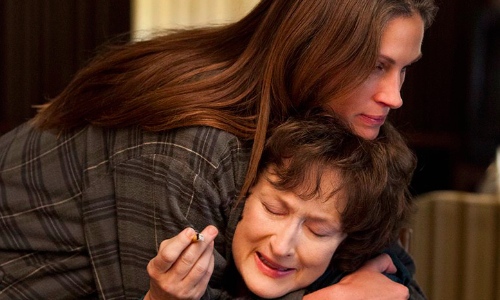Review: August: Osage County

August: Osage County sounds like an anagram, something you might find in a cryptic crossword. And it turns out it is – you can use the letters to spell “a stagy, unctuous ego”, which is a remarkably accurate description (it can also spell “sausage county gout” and “a saggy unctuous toe”, but these are less applicable). It’s a chimera of a film, impressive on the surface but banal and navel-gazing underneath.
The critical reception to the play upon which it’s based was gushingly positive but the transition from stage to screen has been tough – it never really feels like anything other than a play that’s been dragged, by it’s hair, in front of a camera.
It’s similar in tone to Alexander Payne’s Nebraska, in that it’s an interminably bleak family drama, but it lacks the directorial flair or sense of humour of its Oscar rival. More than anything, though, it brought to mind American Hustle: both are self-consciously theatrical, self-congratulatory vehicles for talented actors that amount to far less than the sum of their parts.
Meryl Streep plays the pill-popping matriarch of the Mid West’s most dysfunctional family. The action focuses on the arrival of her trio of daughters to the family home after her alcoholic husband goes AWOL. She’s hideous – a bitter, spiteful creature who has an uncanny knack of homing in on the insecurities of her extended family.
Streep’s turn is equal parts impressive and infuriating. Her considerable talents are more than amply showcased but too often it feels like she’s just showing off. It’s not only Streep, either – the entire saga is an exercise in grandstanding; a big group of thesps slapping each other on the back about how darned talented they all are. Ewan McGregor, for example, is wasted as Bill, the wayward husband of one of the daughters. His part is entirely two dimensional, a throwaway role for a jobbing actor. His entire raison d’être is to act as a counterpoint to his wife – he’s nothing more than a carefully manicured beard with legs and a mangled accent that’s neither American nor Scottish. That he appears at all is pure casting onanism.
Throw Julia Roberts – who received a spurious Oscar nod for her part – Benedict Cumberbatch and Juliette Lewis into the mix and you have too many actorly egos, all nuzzling each other like randy ponies.
It’s not a complete disaster – the dialogue is sharp and the drip feeding of revelations about the family maintains at least a rudimentary level of interest. But where it wants to move or enlighten, I just felt cheated, like I was watching a magic trick whose solution is blindingly obvious.
First published in City A.M.

